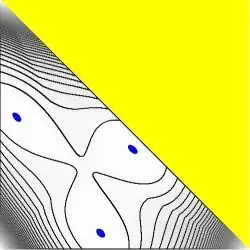Let $a,b,c >0$ with $a+b+c=3$. Prove that $$a^{|b-a|}+b^{|c-b|}+c^{|a-c|} > \frac52.$$
What I did:
It is cyclic inequality so I assume $c= \min\{ a,b,c \}$.
I consider the first case where $a\ge b\ge c$ then
$$a^{|b-a|}+b^{|c-b|}+c^{|a-c|} > \frac52$$
$$\Leftrightarrow \frac{a^a}{a^b} +\frac{b^b}{b^c}+\frac{c^a}{c^c}> \frac52$$
I check function $f(x) =x^x$ to see if it is a strictly monotonic function or not. It turns out that it is a concave up function so I get stuck here.
